Seagate's Momentus XT Reviewed, Finally a Good Hybrid HDD
by Anand Lal Shimpi on May 24, 2010 9:31 AM EST- Posted in
- Storage
- SSDs
- Seagate
- Momentus XT
- Hybrid Drive
- SSHDs
The Test - Real World First
Before we get to our usual benchmarks I put together a few hand timed tests to help convey the experience the Momentus XT offers. Seagate badly wants the world to think that the Momentus XT is SSD-like in its performance. In my opinion it performs more like a fast hard drive rather than an SSD, but regardless of what you want to call it the tests below are designed to help convey the user experience.
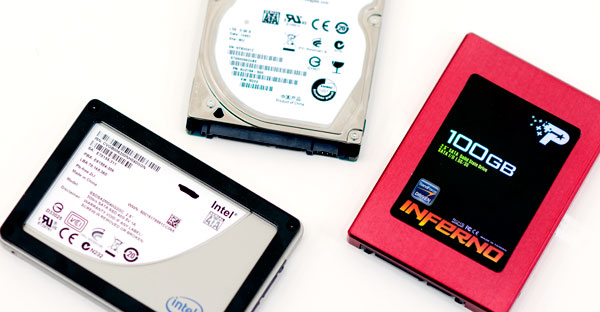
To aid in our comparison I've thrown in two SSDs: the Intel X25-V and the Patriot Inferno. The X25-V is a small, but affordable SSD while the Inferno is based on the SandForce SF-1200 controller making it one of the fastest and most expensive consumer SSDs we've tested. We've also got the new 600GB VelociRaptor and Seagate's own Momentus 5400.6, a fairly standard 5400RPM 2.5" drive for comparison. While a better comparison would have been a modern 7200RPM 2.5" drive, we didn't have one handy in time for this review. The 5400.6 should give you a general idea of how all 2.5" drives will perform though; 7200RPM drives will be faster but not by a huge margin.
These are mature results, measured on the third of three runs so the Momentus XT has more than enough time to learn (between each run I rebooted the machine).
| CPU | Intel Core i7 965 running at 3.2GHz (Turbo & EIST Disabled) |
| Motherboard: | Intel DX58SO (Intel X58) |
| Chipset: | Intel X58 + Marvell SATA 6Gbps PCIe |
| Chipset Drivers: | Intel 9.1.1.1015 + Intel IMSM 8.9 |
| Memory: | Qimonda DDR3-1333 4 x 1GB (7-7-7-20) |
| Video Card: | eVGA GeForce GTX 285 |
| Video Drivers: | NVIDIA ForceWare 190.38 64-bit |
| Desktop Resolution: | 1920 x 1200 |
| OS: | Windows 7 x64 |
Our first test is a timed boot. You are looking at the time from initial OS load (not POST) to getting a cursor at the Windows 7 desktop.
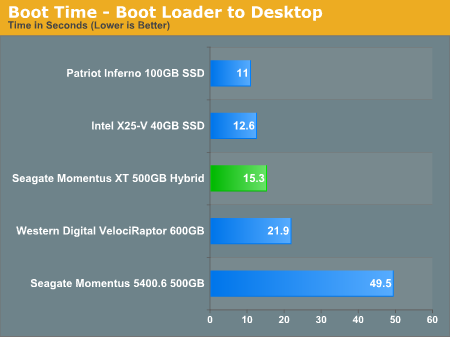
The Windows 7 boot process is a very read intensive task that's easy for the Momentus XT to learn. Seagate may be on to something here, the Momentus XT is much more like a SSD than a HDD in this test. Even the VelociRaptor is no match for it. The SSDs are still faster, but they don't offer nearly the same capacity as the hybrid drive. Compared to a standard 2.5" notebook drive the Momentus XT is a no brainer, it's in a league of its own.
Adobe's Photoshop CS4 is a great application launch test as it can take a fairly long time to load. Here we're just timing the period from clicking on the CS4 icon to ending up at the Photoshop workspace.
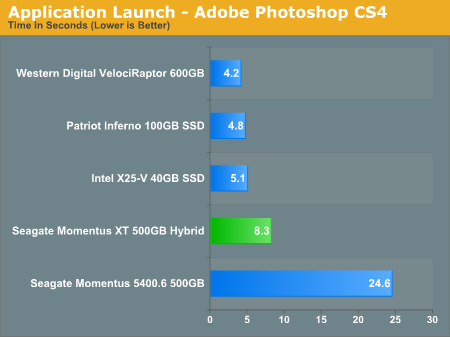
The new VelociRaptor is slightly, but consistently faster than both of the SSDs in this chart. It does still have a few tricks left up its sleeve. The Momentus XT is about half the speed of the SSDs and 10K RPM HDD here, but much faster than the 2.5" 5400RPM notebook hard drive. It's noticeably faster than your standard notebook HDD but it does feel slower than a SSD. That is an important distinction as throughout my experience with the drive it felt like a fast hard drive, rather than an SSD. Part of the reason there is because the NAND isn't used for writes, so you still get the high latency response time whenever there are any random writes happening in the background.
Our standard Photoshop CS4 performance test in our reviews is optimized for comparing CPUs and as such it's set to only record the previous action. With only one level of history, the benchmark is not nearly as disk intensive as Photoshop can get. For this test I ran our CS4 benchmark but left the application at its default setting of remembering the previous 20 actions. With more to keep track of, performance goes down while the reliance on a fast storage subsystem goes up.
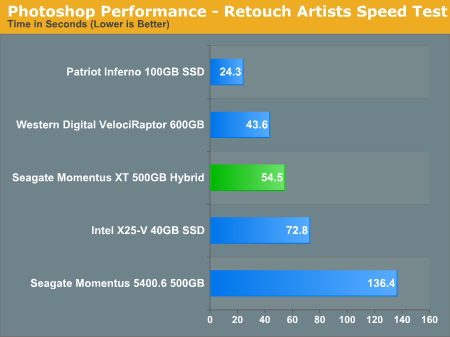
The X25-V is penalized by having a very low sequential write speed. The combination of heavy reads and writes means that the Momentus XT behaves more like a normal hard drive and less like an SSD. The 4GB SLC read cache does help though, while the hybrid drive isn't faster than the VelociRaptor it's pretty close for being a 2.5" notebook drive. The 100GB SandForce drive is much faster than anything else here, but it does offer 1/5 the space at 2.5x the cost of the Momentus XT.
For the next test I wanted to see how well the Momentus XT would cache a single large file. I timed how long it took to load a 70MB Excel sheet:
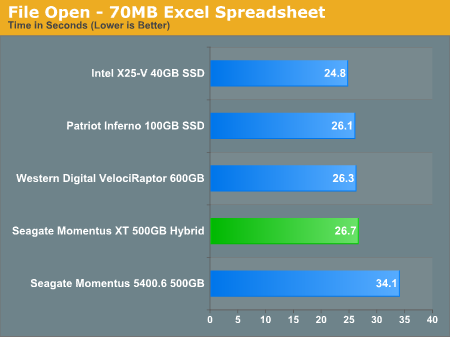
The results are a lot closer than you'd expect. Despite having a 4GB SLC NAND read cache, the Excel load time isn't any better than the VelociRaptor (although it is faster than the 2.5" 5400RPM drive). The upper bound in performance is set by the SSDs so it looks like the Momentus XT's cache does as much as physically possible to improve performance, we're simply bound elsewhere.
My favorite test for showing the usefulness of an SSD is to load a bunch of applications immediately after booting to the desktop. On a system with a hard drive there are usually a lot of disk accesses right after you hit the desktop that will slow down any application launches. A well made SSD acts like nothing is going on in the background. But what about the Momentus XT?
To test it I threw Internet Explorer, Outlook 2007, Access 2007, Excel 2007, PowerPoint 2007, Word 2007 and Photoshop CS4 in the startup folder of my testbed. The times below measure how long it took to load all of those applications immediately after boot:
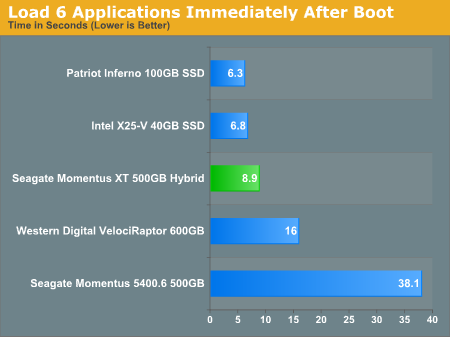
I'm impressed. While it's not quite as fast as an SSD, Seagate's Momentus XT is faster than any hard drive here. It's fast enough in this test where you might even consider using one in a desktop instead of a VelociRaptor. There is still the issue of random write performance (it is a 7200RPM 2.5" drive after all) but this is very good. It's because of this that Seagate believes the Momentus XT is delivering a SSD-like experience and in this test I'd have to agree.










120 Comments
View All Comments
dannysauer - Saturday, July 2, 2011 - link
That's a terrible metaphor. A "100 shot" of nitrous is called a "100 shot" because it's good for 100 horsepower. Dyno tests on properly tuned vehicles repeatedly confirm that the advertised power change is usually within a few HP of the documentation.Now that I think about it, I guess it's inadvertently a good metaphor for poorly understanding technology. :)
In any event, you have a good point that it's deceptive to market this as a "hybrid". It's just a regular drive with a large intelligent cache. They should just say "now! with adaptive caching!" or something.
Chloiber - Monday, May 24, 2010 - link
In the beginning you said you would use a Patriot Inferno, but on most benchmarks it says "Agility 2" ?!OT:
This drive should be a perfect upgrade for all notebook users who think SSDs are too expensive or who need more space than the usual 40-120GB of SSDs.
Anand Lal Shimpi - Monday, May 24, 2010 - link
I only used the Inferno for the new tests, the rest was existing data pulled out of Bench. However the two drives perform the same, they are both SF-1200 based 100GB drives with production firmware :)Take care,
Anand
Chloiber - Monday, May 24, 2010 - link
Ah, no problem then, thought it's a copy&paste error :)Aikouka - Monday, May 24, 2010 - link
What I'm curious about is how this drive handles regularly used files that change somewhat often. Caching can be great for executables or libraries (DLLs, etc), given that they don't change often if at all. But what happens when you have files that are accessed during a specific task that may change every time you perform this task? You said that the algorithm doesn't work with writes, which if it understood what write was coming in, it could intercept and possibly alter the already cached data to the new value.This mostly came from a nerdy WoW example where while textures and such don't normally change too often, add-on settings can possibly change every time you load the game (and load-up can be pretty ardruous with a lot of add-ons). So, if these settings files are changing possibly every time, the cache values will be out of date and it'll have to use its poor Random Read rate to access the proper data.
It's really just one drop in the bucket of the many examples you can think of where this drive wouldn't have a problem, but start-up time in WoW is one of the reasons why I went with the Intel X25-M to begin with... when I bought it, it was pretty much top notch in random read performance.
Anand Lal Shimpi - Monday, May 24, 2010 - link
As is the case with any cache there has to be some mechanism to invalidate data in the cache if the original data is modified. I believe that's what happens here. There's a table of LBAs that are cached and if one is modified then the cached version is immediately invalidated and/or updated.Take care,
Anand
Aikouka - Monday, May 24, 2010 - link
Definitely true with cache invalidating.I think I was reading a bit too far into this line:
"the Momentus XT however, the SLC NAND acts exclusively as a read cache - writes never touch the NAND."
and considering that it meant that the caching wouldn't access incoming writes for validating cached data. It sounded odd that way as it'd make caching an absolute sleeping bear of a problem. I'm assuming the statement is meant to be taken literally -- the drive simply doesn't write cache to help speed up writes.
Thanks for the clarification on a sleepy Monday morning and bienvendo!
siberian 3 - Monday, May 24, 2010 - link
Hi Anand do we know what will happen if the NAND fail and not the mechanical part of the drive?Will the user lose the DATA it is on the drive
jaydee - Monday, May 24, 2010 - link
Anand, how do you think this would compare if they chose to do, say 8GB of MLC instead of 4GB of SLC? Surely it would bring the cost down, and I would think the double cache would be more important than the decrease in speed?Chloiber - Monday, May 24, 2010 - link
It has also something to do with reliability/lifetime, not just performance.